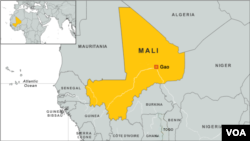Aid agencies are fighting a renewed cholera outbreak in rebel-controlled northern Mali, one of several parts of West Africa dealing with the disease.
Authorities in Mali's Gao and Asongo districts have reported 147 cases and 12 deaths since early July. The number of cases, which had begun to fall earlier this month, are again on the rise, aggravated by the rainy season.
The International Rescue Committee's Senior Emergency Coordinator in Mali, Tasha Gill, said people should go to a health center at the first sign of illness. "Our slogan is the first vomiting at the house, the second one in the health center," Gill said. "This is life-saving and this will prevent transmission to other members of the family and neighbors."
Al-Qaida-linked Islamist militants have been in control of northern Mali since April. Gill said aid agencies, in partnership with the government, have just relaunched a radio prevention campaign after militants objected to the musical backgrounds on previous announcements.
Cholera outbreaks have also been reported in Niger, Guinea, and Sierra Leone. Sierra Leone has declared a state of emergency as the number of cases since January nears 11,000, more than half of those in the past five weeks.
Cholera is a highly contagious diarrheal disease that leads to severe dehydration and even death, if not treated quickly. It is transmitted by ingesting food or water contaminated by bacteria.
Access to safe drinking water remains a challenge, particularly around the Niger River, a key source of transmission.
Gill said aid agencies are working to chlorinate key water sources but families should also treat their drinking water at home and wash hands frequently with soap or bleach, in particular before eating and after going to the bathroom.
Authorities in Mali's Gao and Asongo districts have reported 147 cases and 12 deaths since early July. The number of cases, which had begun to fall earlier this month, are again on the rise, aggravated by the rainy season.
The International Rescue Committee's Senior Emergency Coordinator in Mali, Tasha Gill, said people should go to a health center at the first sign of illness. "Our slogan is the first vomiting at the house, the second one in the health center," Gill said. "This is life-saving and this will prevent transmission to other members of the family and neighbors."
Al-Qaida-linked Islamist militants have been in control of northern Mali since April. Gill said aid agencies, in partnership with the government, have just relaunched a radio prevention campaign after militants objected to the musical backgrounds on previous announcements.
Cholera outbreaks have also been reported in Niger, Guinea, and Sierra Leone. Sierra Leone has declared a state of emergency as the number of cases since January nears 11,000, more than half of those in the past five weeks.
Cholera is a highly contagious diarrheal disease that leads to severe dehydration and even death, if not treated quickly. It is transmitted by ingesting food or water contaminated by bacteria.
Access to safe drinking water remains a challenge, particularly around the Niger River, a key source of transmission.
Gill said aid agencies are working to chlorinate key water sources but families should also treat their drinking water at home and wash hands frequently with soap or bleach, in particular before eating and after going to the bathroom.





